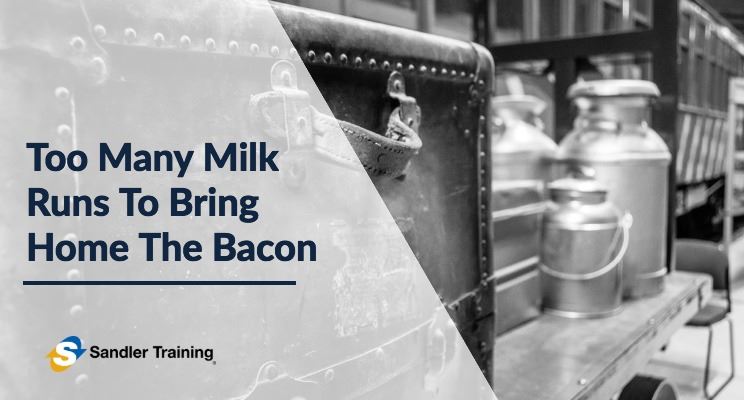It’s not uncommon to hear sales leaders lamenting about milk runs. You know the story. The salesperson has a handful of favorite accounts and visits them on a regular basis. There is a lot of banter about fishing, how the garden is coming along, pictures from vacation, and a breakdown of last week’s game. There isn’t a lot of business being discussed. The salesperson is “advancing the relationship” and the customer welcomes the chance to chat up an old friend. Sound familiar?
The term milk run was coined during World War II when the US Army Air Corps and the Royal Air Force embarked on a mission where little enemy resistance was expected. The flights were routine. Same ole, same ole. Just going through the motions.
Lots of salespeople are taking trips where there is a low chance of discomfort, very little risk, and nothing eventful is expected to happen. And it’s costing companies millions of dollars.
How did we get here?
Salespeople are human. Left to our own devices, we seek comfort. When it’s cold, we turn up the heat. When we are too hot, we crank up the AC. It seems that the modern world has engineered us to be comfortable 24 hours per day, 7 days per week. And as comfort seeking creatures, we bring that into our sales activities. It’s uncomfortable to prospect so I over-service my current clients. It’s out of our comfort zone to risk rejection, so we talk about things we know we’ll get agreement on. Meeting new people is harder than catching up with old friends. So, we seek comfort. We go where we are liked. We let the customer control the process. We don’t ask questions that could lead to a no. Hello, milk run.
The two jobs of a salesperson
When you think about it, salespeople have two jobs. First, our job is to protect and grow our current accounts. We must keep the competition away, look for other areas where we can help solve our customer's problems and deliver on the promises we have made. Our other job is to plunder the accounts of our competition. Look for chinks in the armor. Find problems they haven’t found. Develop relationships higher and wider in the organization. To avoid making milk run calls, salespeople would do well to remember one important fact - your best customer is your competition’s top prospect. While we are talking about the football game, they may be talking about the problems they solve. They are testing the strength of our relationship. They may be talking to the boss upstairs, who is far removed from the work we are doing, while we are on the floor catching up with our buddy. It leaves us in a vulnerable place.
So, what can we do to stop the milk runs and bring home the bacon?
First, we must have an objective for the call. If there is no defined objective for the call, then don’t make the call. Your time is too valuable. Heck, your customer’s time is too valuable. We want to be in a position to obtain one of the four positive outcomes of a sales call; a yes, a no, a referral, or a clear, well-defined future. With no objective, there can be no positive outcome.
A solid pre-call plan will help us determine who else in the organization we’d like to meet. Even our best accounts are at-risk if we have only one or two relationships. Who are the people higher in the organization we don’t know or their peers in other departments we haven’t met? Is our customer contact using all of our products and services? Can we anticipate other pains and challenges we may be able to solve? What questions will we ask to uncover other potential pain points?
These are but a few of the questions and tactics that the sales staff must be engaged in on each and every call. There is no staying the same with an account. We are either moving in a positive direction and strengthening our position or we are slowly decaying. Managers must insist that their teams say no to milk runs. Field rides, call debriefings, and coaching sessions will allow the manager to look for the signs and symptoms of these chronic time-wasters.

Robin Green
Robin Green is the President and Owner of Ascend Performance, Inc., a certified and award-winning Sandler Training Center in Richmond, VA. He specializes in helping companies of all sizes to develop the Attitudes, Behaviors, and Techniques that will help them reach new levels. Robin is a keynote speaker and podcast host. You can reach him at robin.green@sandler.com. He helps companies and motivated individuals with sales, management, and customer service training.






